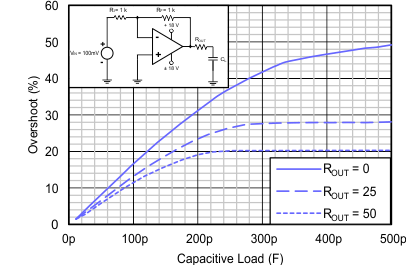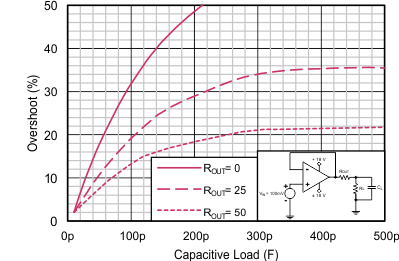SBOS784C November 2016 – January 2019 TLV172 , TLV2172 , TLV4172
PRODUCTION DATA.
- 1 Features
- 2 Applications
- 3 Description
- 4 Revision History
- 5 Device Comparison Table
- 6 Pin Configuration and Functions
- 7 Specifications
- 8 Detailed Description
- 9 Application and Implementation
- 10Power Supply Recommendations
- 11Layout
- 12Device and Documentation Support
- 13Mechanical, Packaging, and Orderable Information
Package Options
Mechanical Data (Package|Pins)
Thermal pad, mechanical data (Package|Pins)
Orderable Information
8.3.4 Capacitive Load and Stability
The dynamic characteristics of the TLVx172 are optimized for common operating conditions. The combination of low closed-loop gain and high capacitive loads decreases the phase margin of the amplifier and can lead to gain peaking or oscillations. As a result, heavier capacitive loads must be isolated from the output. The simplest way to achieve this isolation is to add a small resistor (for example, ROUT equal to 50 Ω) in series with the output. Figure 27 and Figure 28 show graphs of small-signal overshoot versus capacitive load for several values of ROUT. See the Feedback Plots Define Op Amp AC Performance application note for details of analysis techniques and application circuits.

| 100-mV output step, G = –1 |

| 100-mV output step, G = 1 |